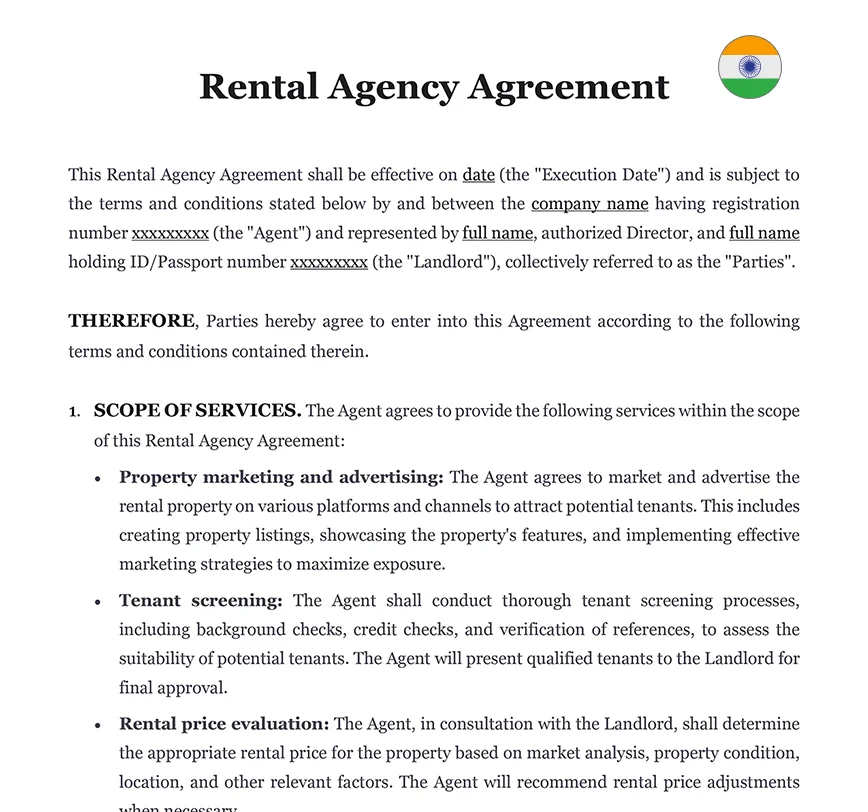Ready to use legal template
Drafted by experienced lawyers
Compliant with Indian law
Ready to use legal template
Drafted by lawyers
Compliant with Indian law
Home › Rent your property › Rental Agency Agreement
Learn more about Rental Agency Agreement
A Rental Agency Agreement, also known as a Property Management Agreement, is a legal contract between a property owner (referred to as the “Principal” or “Landlord”) and a rental agency (referred to as the “Agent” or “Property Manager”). This agreement outlines the terms and conditions under which the rental agency will provide property management services on behalf of the landlord.
Table of contents
What is a Rental Agency Agreement?
What services does the rental agency provide?
How are fees structured in India?
What responsibilities does the Landlord retain?
What should a Rental Agency Agreement include?
Can I cancel the Rental Agency Agreement early?
What happens if the property doesn't get rented?
What is a Rental Agency Agreement?
A Rental Agency Agreement, also known as a Property Management Agreement, is typically used when a property owner (landlord) wants to engage the services of a rental agency (property manager) to handle the day-to-day management and operation of their rental property. The agreement establishes the legal relationship between the landlord and the rental agency, outlining the rights, responsibilities, and obligations of both parties.
A Rental Agency Agreement is commonly used in the following situations:
1. Residential rental properties: Landlords who own residential properties such as houses, apartments, or condominiums may enter into a Rental Agency Agreement to delegate the tasks of tenant screening, lease management, rent collection, maintenance coordination, and other property management responsibilities to a rental agency.
2. Commercial rental properties: For landlords who own commercial properties like offices, retail spaces, or industrial buildings, a Rental Agency Agreement may be used to hire a rental agency to handle leasing, tenant relations, property maintenance, and other management tasks related to commercial rentals.
3. Absentee landlords: Landlords who are unable to personally manage their rental properties due to distance, time constraints, or other reasons may opt to engage a rental agency to handle the property management on their behalf. The Rental Agency Agreement outlines the specific services to be provided by the agency.
4. Multiple rental properties: Landlords with a portfolio of rental properties may find it more efficient and convenient to work with a rental agency to manage their properties collectively. The Rental Agency Agreement can cover all properties under the landlord’s ownership or specify individual properties to be managed.
5. Investor partnerships: In cases where multiple investors own a rental property together, they may enter into a Rental Agency Agreement to delegate property management responsibilities to a rental agency. This helps ensure that all investors’ interests are properly represented and that the property is professionally managed.
What services does the rental agency provide?
In India, the services provided by a rental agency can vary based on the terms outlined in the Rental Agency Agreement. In this agreement template, the rental agencies offer a range of property management and leasing services to landlords. These services may include:
Marketing and Advertising: Creating listings and advertising the rental property through various channels to attract potential tenants.
Tenant Screening: Conducting background checks on prospective tenants, including credit checks, rental history verification, and employment checks.
Property Showings: Arranging and conducting property showings for interested tenants.
Lease Preparation and Execution: Drafting and finalizing the Lease Agreement between the landlord and the tenant, ensuring legal compliance.
Rent Collection: Collecting monthly rent payments from tenants and ensuring timely disbursement to the landlord.
Maintenance and Repairs: Coordinating and overseeing routine maintenance and repairs on the property, often in consultation with the landlord.
Inspections: Conducting regular inspections of the property to assess its condition and identify any necessary repairs or improvements.
Handling Tenant Concerns: Addressing tenant queries, concerns, and requests on behalf of the landlord.
Eviction Procedures: Assisting with the eviction process if necessary, including serving notices and following legal procedures.
Market Analysis: Providing the landlord with market analysis and insights to help set competitive rental prices.
Legal Compliance: Ensuring that all aspects of property management and leasing adhere to local and national laws and regulations.
Documentation and Record Keeping: Maintaining accurate records of lease agreements, tenant information, and financial transactions.
It’s crucial for landlords to thoroughly review the terms of the Rental Agency Agreement to understand the specific services offered by the rental agency and any associated fees. Landlords may also negotiate certain services based on their preferences and requirements.
How are fees structured in India?
In India, the fees structure for rental agencies is outlined in the Rental Agency Agreement and commonly involves commission-based fees, where the agency charges a percentage of the monthly rent (typically 5% to 15%), or flat fees, which are fixed amounts for specific services. Additionally, one-time placement fees are charged for successfully securing a tenant, and renewal fees may apply for lease renewals.
Some agencies may impose vacancy fees for prolonged periods of property vacancy, and maintenance and repair markups can be included. It is essential for landlords to thoroughly review and negotiate fee structures to ensure transparency and alignment with their specific needs.
What responsibilities does the Landlord retain?
While engaging a rental agency in India, landlords typically retain certain responsibilities outlined in the Rental Agency Agreement. These may include major decisions related to the property, such as approving significant repairs, renovations, or property improvements.
The landlord may also retain the responsibility for setting rental prices, approving tenant applications, and making key decisions regarding the property’s long-term strategy.
The landlord may also be accountable for addressing legal matters and liabilities related to the property. The specifics of retained responsibilities can vary, and it’s essential for landlords to carefully review the terms of the agreement to understand their ongoing duties and ensure a collaborative relationship with the rental agency.
What should a Rental Agency Agreement include?
This agreement outlines the terms and conditions under which the rental agency will provide property management services on behalf of the landlord. Here are some key elements that should be included in a Rental Agency Agreement:
Parties involved: Clearly identify the landlord (referred to as the “Principal”) and the rental agency (referred to as the “Agent” or “Property Manager”) involved in the agreement. Include their legal names, contact information, and addresses.
Scope of services: Clearly define the property management services that the rental agency will provide on behalf of the landlord. This may include tasks such as advertising and marketing the property, screening and selecting tenants, collecting rent, handling maintenance and repairs, managing tenant relations, and complying with legal and regulatory requirements.
Term and termination: Specify the duration of the agreement, including the start date and end date. Additionally, outline the provisions for termination, including notice periods and conditions under which either party can terminate the agreement.
Compensation and fees: Clearly state the compensation structure for the rental agency’s services. This may include details of the management fee, which can be a percentage of the monthly rental income or a fixed fee. It’s also important to outline any additional fees or charges, such as leasing fees, renewal fees, maintenance fees, or other costs that may be incurred.
Authority and permissions: Clarify the authority and permissions granted to the rental agency. This may include the agency’s authority to sign lease agreements, set rental rates, handle security deposits, and make financial decisions on behalf of the landlord. Outline any limitations or restrictions on the agency’s authority.
Maintenance and repairs: Specify the responsibilities of the rental agency regarding property maintenance and repairs. This includes outlining the procedures for addressing maintenance requests, setting spending limits for repairs, and obtaining the landlord’s approval for significant expenses.
Accounting and financial reporting: Define the process for financial management and reporting. This may include requirements for rent collection, handling security deposits, providing regular financial statements to the landlord, and outlining the procedures for reconciling and disbursing rental income.
Insurance and liabilities: Address insurance requirements and liabilities. Specify whether the rental agency is responsible for obtaining property insurance, liability insurance, or other forms of coverage. Outline the responsibilities and liabilities of each party in case of property damage, accidents, or legal claims.
Dispute resolution: Include provisions for resolving disputes that may arise between the landlord and the rental agency. This may involve specifying the process for mediation, arbitration, or other methods of alternative dispute resolution.
Governing law: State the jurisdiction or governing law that will apply to the interpretation and enforcement of the agreement.
Can I cancel the Rental Agency Agreement early?
The ability to cancel a Rental Agency Agreement early in India is contingent on the terms stipulated in the agreement itself.
Typically, Rental Agency Agreements have specific provisions outlining the conditions under which either party can terminate the contract prematurely. Common termination triggers may include breaches of contractual obligations, mutual agreement, or adherence to notice periods specified in the agreement.
Landlords seeking to cancel the agreement should carefully review its terms, assess the reasons for termination, and adhere to any stipulated notice requirements or contractual obligations. In some cases, early termination may be subject to penalties or fees as outlined in the agreement.
What happens if the property doesn't get rented?
If a property managed by a rental agency in India remains unrented for an extended period, the specifics of the situation are typically addressed in the terms of the Rental Agency Agreement.
This agreement includes provisions regarding vacancy fees, where the landlord agrees to compensate the agency for ongoing marketing efforts and services even if the property remains unoccupied. It’s crucial for landlords to thoroughly review the agreement to understand any financial implications during periods of vacancy.
Communication with the rental agency is also key to discussing strategies for attracting tenants, potentially adjusting rental pricing, and collaboratively addressing the challenges of securing tenants in a competitive market.
SPECIAL OFFER
Landlord
10 Document Package
Essential documents for managing rental property in India
Rental Agency AgreementTemplate (.docx)
Save on attorney fees
310 client reviews (4.8/5) ⭐⭐⭐⭐⭐
Share information
Why Themis Partner ?
Make documents forhundreds of purposes
Hundreds of documents
Instant access to our entire library of documents for India.
24/7 legal support
Free legal advice from our network of qualified lawyers.
Easily customized
Editable Word documents, unlimited revisions and copies.
Legal and Reliable
Documents written by lawyers that you can use with confidence.




